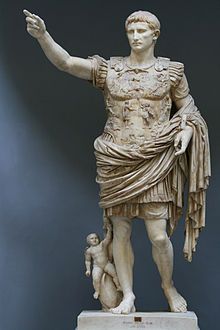Brown could learn from Augustus about tax flight
By Wayne Lusvardi
California Gov. Jerry Brown often portrays himself as the modern version of an ancient Greek or Roman philosopher king. A majority of the voters on Nov. 6 approved Brown’s “millionaire’s tax” on people making more than $250,000 a year, Proposition 30. But Brown could learn something from Roman Emperor Augustus about how to sustain a tax on the rich without a tax flight and business disinvestment.
Around the year 6 A.D., Augustus resolved a simmering financial crisis to the empire by reforming the military pension system. Augustus changed the pension system from receiving farmland to payment in cash. Because this overtaxed the treasury, Augustus made a large contribution from his private resources as well as contributions from others. An inheritance tax of 5 percent on wealthy citizens and a tax of 1 percent on auction sales were enacted. In return, the length of military service was extended from 16 to 20 years. According to historian Klaus Bringmann, Augustus’ historic tax reform eliminated the twin dangers of confiscating wealth and the erosion of the rule of law.
Bringmann says Augustus’ tax was successful because he returned to a public order based on “law and justice” and the protection of private property rights. Augustus’ cash pension system no longer threatened Roman elite property owners that their farmland would have to be confiscated to provide pension farms for military veterans.
Additionally, the old senatorial rule by propertied elites was restored after it had been lost under the rule of the Roman version of the modern Democratic Party — called the Gracchi after plebian nobles Tiberius and Gaius. This resulted in the public perceiving taxes as legitimate and restoring unity instead of political dysfunction.
Looming Eclipse of the “Consent of the Taxed”
Augustus’ tax regime sounds very similar to the superficial pension reforms recently passed by Brown and the Democratic Party-controlled state Legislature. And Brown’s millionaire’s tax seems structured along the lines of Augustus’ tax: an income tax increase of up to 3 percentage points on those making $250,000 or more, plus a 0.25 percentage point increase in the state sales tax rate.
Unfortunately for Brown, the control of the Legislature is about to turn into a supermajority by his Democratic Party. Brown and the legislature will have no way to obtain the “consent of the taxed” because wealthy Republican legislators effectively will be disenfranchised. The recent political reforms of redistricting and majority vote to pass taxes in the Legislature will only aggravate the destructive struggle for power in the state. The wealthy will likely take actions to protect their property and their wealth.
Californians have already had the state threaten to impose a tax on all the property owners in San Bernardino County to undertake a wealth transfer by using eminent domain. In San Diego County, the wealthy Poway School District has already imposed a “capital appreciation bond” — equivalent to a negative amortizing mortgage — on property owners. This deferred payment bond is likely to sink home values when it comes due in 2032. Property values are under threat by government confiscation and taxation in both poor and wealthy counties in California.
Fortunately, California voters rejected Proposition 31. It would have ended up creating new regional government councils to take taxes from wealthy suburbs and share them with big cities and school districts that have overspent their budgets.
Brown will need to create a new political legitimacy to maintain unity and sustain “taxation without representation” on the wealthy. However, he has shown little inclination to create such a new political legitimacy other than by rule of labor unions and elites who benefit from political patronage.
Augustus said, “After this time I surpassed all others in authority, but I had no more power than others who were also my colleagues in office” and warned to “make haste (change) slowly.”
In a recent interview in Esquire magazine, Brown seemed to echo Augustus.
“I’ve been reviewing the history of the late Roman republic, and I found that the struggles between the senators — or what were called the optimates versus the populares — were endless and often violent. Some senators lined up with the masses. Others were more conservative and upheld the traditions of the elite and the old families. These struggles got more and more violent, and ultimately it all broke down. It seems like the nature of a republic is that there is a lot of struggle. That’s just the way it is…. Looking back, what I appreciate is the stability of these larger institutions, or their inertia–they move very slowly. Whether you’re trying to change a school system or a political party or some bureaucratic aspect of government, things just move relatively slowly. Absent a crisis, you can only nudge them. The people elected for four years or eight years are bit players.”
Brown can’t restore Republicans to the state Senate like Augustus could to establish political legitimacy with the wealthy and the propertied. This has resulted in a legitimacy crisis for Brown and the California Republic.
Crossing the Rubicon River
Paraphrasing Augustus, Brown says that that he is just a “bit player” who can only “nudge” rather than lead or use his executive powers. The fate of California’s republic depends more on governor Brown now that the Democratic Party has crossed the proverbial Rubicon River of total one-party rule and disenfranchisement of the business class. In 49 B.C. the Roman Army under Julius Caesar crossed the Rubicon River into the sovereign territory of the Roman Senate. The result was political instability and civil war, leading to the decline of the Roman Republic and the rise of the Roman Empire.
Has California reached a similar point of no return? Or can Brown exercise leadership to bring about political legitimacy for a new nearly unlimited tax and spending regime? Or will Augustus Brown be content to just be a philosopher king?
Related Articles
AAA Double Wrong on Propositions
John Seiler: Today I got in the mail the Automobile Club of Southern California’s ballot recommendations, limited to four of
Field Poll: Dems win in CA, schools chief close
It isn’t over till it’s over, Yogi Berra famously said. But in California’s partisan statewide races, it might be just
Few donors, big support for Prop. 47
With California’s Proposition 47, advocates of criminal justice reform have created a potent test case for national policy. But financial support for





